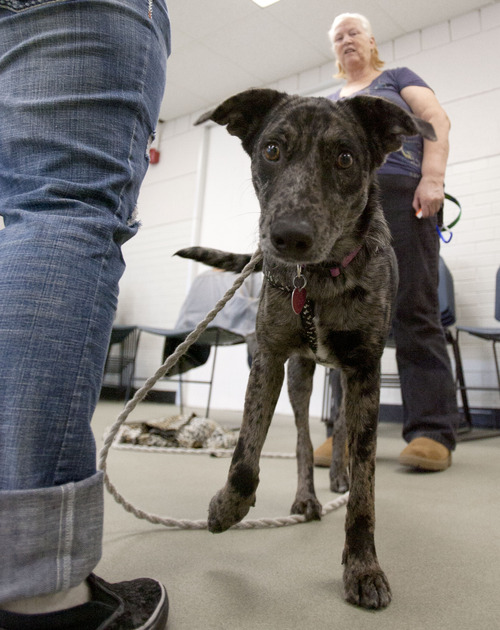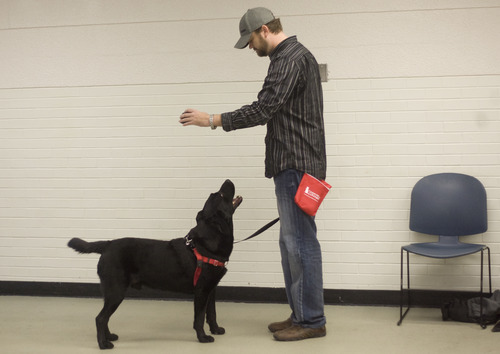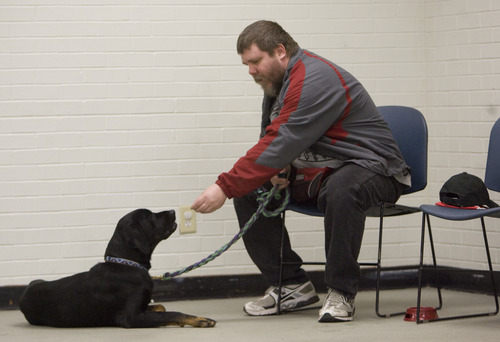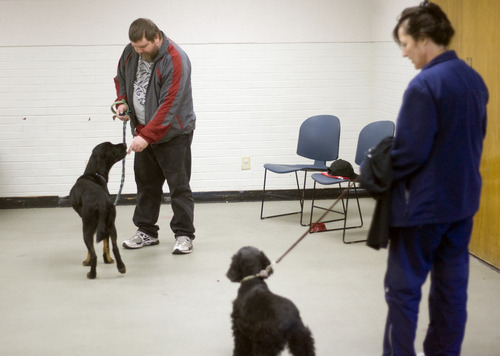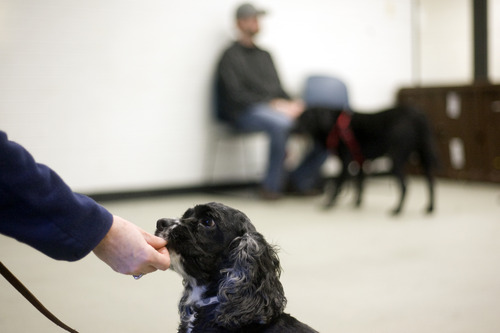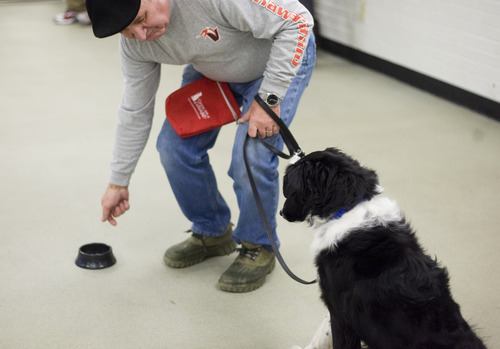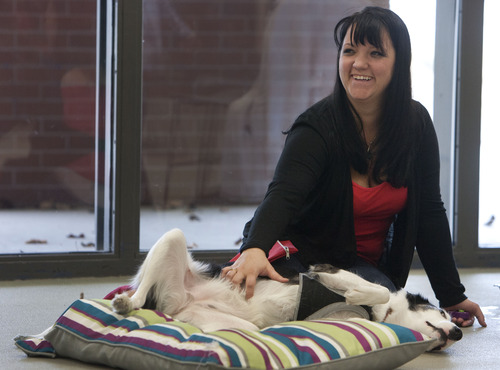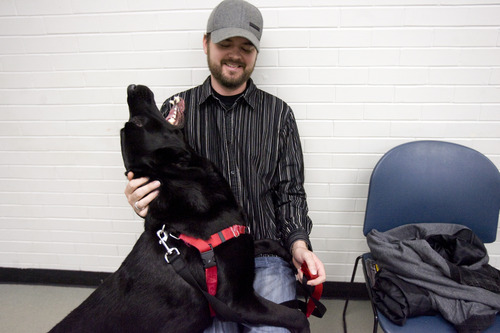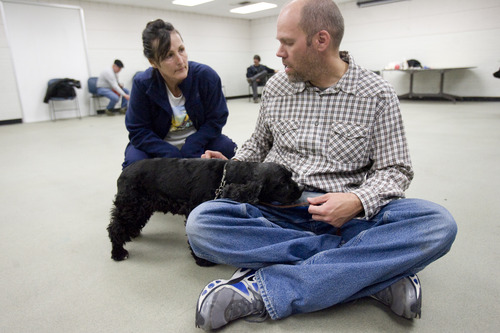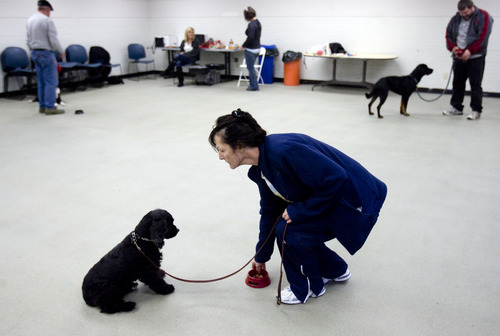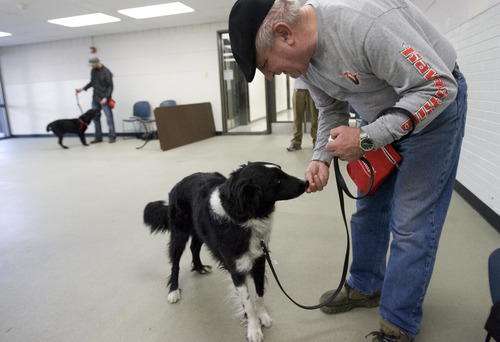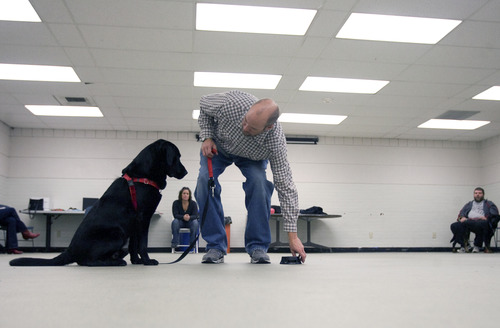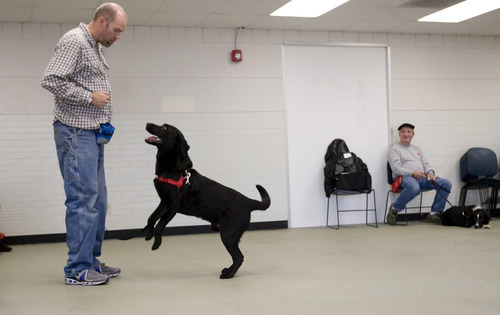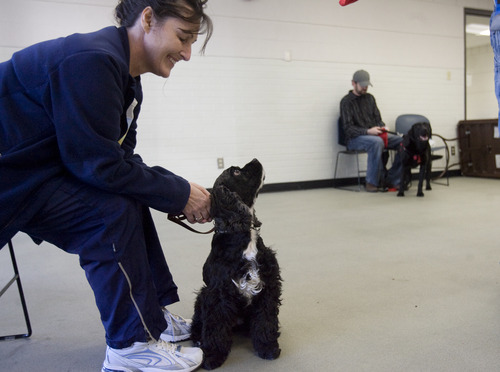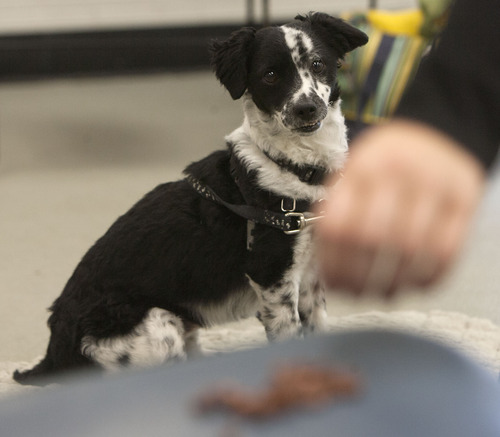This is an archived article that was published on sltrib.com in 2013, and information in the article may be outdated. It is provided only for personal research purposes and may not be reprinted.
When Austin Cochran awoke from his first seizure in August, he was 15 feet from his couch, surrounded by vomit and bleeding from his tongue.
And then things got really bad.
He was hospitalized for a month, had three kidney surgeries to deal with kidney stones, lost 40 pounds and spiraled into his worst depression since leaving the Air Force in 2006.
"I was at my wit's end, and that's when I saw the dog," Cochran, 34, remembers.
Grizz, a year-old black English Labrador rescued by the Utah nonprofit Canines With A Cause, now is rescuing Cochran.
A maintenance mechanic for the Bureau of Land Management, Cochran took Grizz out in the field, to Randolph in far northern Utah, shortly after adopting the dog on Nov. 27.
"He was there the entire time, chipper as could be. I think I was cracking my first smile in a long time," says Cochran.
"Since I've gotten Grizz, I haven't had any panic attacks, I'm not depressed. I don't want to be in the house. It's a huge turnaround."
Transformations such as Cochran's are nothing new to Cathy King, the former executive director of Friends of Animals Utah who founded Canines With A Cause two years ago.
"Not every person is a dog person, but for those who are, it's life changing," says King.
The nonprofit matches dogs that otherwise would be killed in shelters with veterans who have post-traumatic stress disorder. In classes that span up to a year, veterans learn to train their dogs — newly adopted or long-time pets — to be companion dogs capable of retrieving medicine, alerting to seizures or leading their owners out of crowds when panic attacks strike.
The training is all about positive reinforcement — no scolding, domination or choke chains — and that often spills over into other aspects of a vet's life, says King. "Training itself is therapy."
Besides finding dogs for vets to adopt, Canines With A Cause covers costs such as spaying, neutering, shots and microchip implantation. A national nonprofit, Pets For Patriots, typically gives the vet a $100 pet store gift card to buy supplies such as leashes, crates and food.
Many of the veterans are referred by therapists at the George E. Wahlen Department of Veterans Affairs Medical Center or its Vet Centers along the Wasatch Front. The VA, however, does not pay for the cost of service animals for vets with PTSD.
In a decision issued this fall, the VA said the benefits are only anecdotal so far and more research is needed to prove the value of such service animals.
The one major study into the subject, at a VA hospital in Tampa, Fla., was halted this fall after two incidents: a dog in the program bit a girl and then one of the dog-training groups was accused of mistreating animals.
—
Sense of purpose • Justyn Manley, a social worker at the VA hospital, says she has all the evidence she needs.
Manley and a therapist from the Vet Center in Murray often bring their own dogs to Canines With A Cause classes on Fridays at the Northwest Recreation Center in Salt Lake City. Classes also meet in Orem.
"We all know the human desire to connect with other living beings," says Manley on a recent Friday, as Cochran and others teach their dogs to sit calmly before eating.
Manley says she watches veterans lose some anxiety and depression and gain a sense of purpose as they work with dogs. "The relationship component is key," she says.
Moreover, owning and training a dog forces the vet to be more physically active, and that's important for treatment, she says.
Steve Seamons, who suffers from PTSD related to the spinal meningitis he suffered in Navy boot camp decades ago, says his new border collie, Jaxx, makes a big difference.
"He licks me and brings me around when I get depressed," says Seamons, who served two tours in Vietnam.
Some veterans come to the training sessions just for the love of dogs — and to help train companion animals that will go to other vets.
"I know the dogs. I don't know the people," says Steve Peters, an Air Force veteran who served from 1981 to 1992 but is now homeless and unable to own a dog.
"Just to be with somebody or something is a benefit," he says.
—
'I want to set a good example' • Stephanie Bennett was raped by another Marine when she was still a teenager, fresh out of boot camp and in military school to become a basic electrician.
Now, a decade later, she is telling Shaun Woodard, the Canines With A Cause trainer, that there's no way she and her dog, Fly, are going on the Utah Transit Authority's TRAX train.
Bennett suffers from severe PTSD and is especially anxious around men. She attends a class that has only women veterans.
Woodard assures Bennett that she'll be ready when their venture onto public transportation eventually comes — one of the skills each vet-dog pair must master.
For now, though, she needs to work on the basics of taking Fly in public.
"She always senses when I'm having an anxiety attack, but I want to teach her what to do when that happens," says Bennett.
"When I'm in a store and have a panic attack I want to say 'Out' and have that be the clue to get me to the door."
Bennett's son, Damian, 6, has long served as something of a "service person," distracting her when she begins to panic, keeping people from getting too close. "I'm really happy I raised this awesome human being, but I know as a mom that he needs to be a child."
Fly, she says, is beginning to take over some of the service role.
The dog also gives her hope that she'll be able to study nutrition and become a personal trainer as well. Exercise, she says, helped her lose 100 pounds in two years and get off medications. Already, Fly helped her overcome anxiety enough to coach Damian's soccer team in the fall.
"I want to set a good example for my child."
—
'Not as much anxiety' • Cochran says his hope for Grizz is that he will sense when Cochran's about to drop another kidney stone or have another seizure.
In the Air Force from 2000 to 2006, Cochran was in the 82nd Airborne and was based in Afghanistan when the war was beginning there. He helped build Bagram Air Base.
His next deployment was to South Korea, where his kidneys were exposed to radiation as he worked on a radar system. Since then, he's had dozens of kidney stones. Having Grizz, he says, "is more reassuring than anything. There's not as much anxiety of 'Am I going to have another one?' "
For now, though, the first time he takes Grizz to class, he does a silent victory pump with his arm after Woodard successfully teaches the Lab to wait politely for his bowl of kibble.
Woodard, as skilled with humans as he is with dogs, glances at the beaming vet. "Proud papa," he mutters, turning Grizz back over to his dad.


